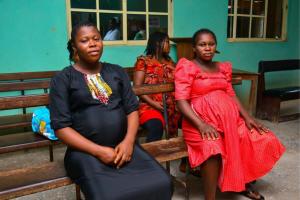Nigeria pushes for companionship in labour to improve maternal health services
Abuja, 9 February, 2021 - “My husband was with me in the delivery room during the birth of our second child. His presence made the labour pain tolerable. It gave me a sense of calm as it had a psychological and emotional effect on me,” says Mrs Taliah Chukwuma, a businesswoman.
''We were fortunate that the hospital where I delivered allowed spouses or relatives to be present in delivery rooms. We had been looking forward to the experience,'' Mrs Chukwuma, one of the Nigerian women who have benefitted from the companionship in labour programme supported by the World Health Organization (WHO) adds.
WHO, in partnership with the Federal Ministry of Health (FMOH) using the Nigeria Maternal and Perinatal Database for Quality, Equity and Dignity (MPD-4-QED) programme supported by MSD for Mothers, has been encouraging hospitals to allow expectant mothers to have the option of choosing a companion, spouse or relative to be present in the delivery room.
One of the approaches adopted using the MPD-4-QED programme is promoting companionship in labour as an indicator of quality care in 54 tertiary hospitals across Nigeria. MPD-4-QED has been using a standardized electronic platform to collect, collate and audit routine maternal and perinatal data in tertiary health facilities across the country.
Narrating her experience, Mrs Chukwuma said she was glad that her husband was with her.
''His presence made the labour easier though the pain was there. He was there holding my hands and whispering soothing words. The fact that someone is supporting you gives goes a long way in relieving the pains. He saw the pains women go through to birth a child. It made him appreciate the baby and me more, it also helped me heal faster. I am happy WHO is promoting this so that other women can benefit too,'' she said.
Meanwhile, Mrs Chukwuma's husband, Uche, expressed mixed feelings over the experience.
''Witnessing the birth of a child is an experience every man ought to have, but I can tell you it is not easy,'' he said. ''I am glad I was there to give the emotional, physical and psychological support by being in the delivery room with her.''
Training health workers for implementation
Since the implementation, the numbers of women in the South-South and North-Central zones, who had people stay with them during delivery have increased. An observational study from 12 health facilities in Ilorin, Kwara state showed that 84.4% of pregnant women desire company during labour. Of these, 14.2% of the participants once had a partner present at previous deliveries while 84.4% were satisfied with the experience.
Meanwhile, the Deputy Director/Safe Motherhood and Desk Officer for Maternal and Perinatal Death Surveillance and Response (MPDSR) FMOH, Dr Samuel Oyeniyi, said companionship in labour at the request of the mother builds trust, safety and happiness. He said this occurs even when the mother is in pains, as natural anaesthesia comes with the joy of being a mother.
“However, to successfully institutionalize the practice across the country, several steps need to be taken, including changes to the delivery wards and policy at the health facilities level,” says Dr Bose Ezekwe, of WHO Nigeria.
“Whether a companion will be allowed during childbirth depends on the health facility as many primary healthcare centres, and tertiary health facilities in Nigeria operate open wards with multiple beds separated by curtains to ensure privacy. In centres where it was successful, many women chose their husbands, mothers, mothers-in-law or sisters as the companion of choice,” said Dr Ezekwe.
The MPD-4-QED programme is supported by funding from MSD, through MSD for Mothers, the company’s $500 million global initiative to help create a world where no woman has to die while giving life. MSD for Mothers is an initiative of Merck & Co., Inc., Kenilworth, NJ, U.S.A.
Technical Contacts:
Dr Faraj Zoulikha, Email: farajz [at] who.int (farajz[at]who[dot]int); Tel: +234 803 9795 149
Dr Ezekwe Bosede; Email: ezekweb [at] who.int (ezekweb[at]who[dot]int); Tel: +234 706 827 9812



